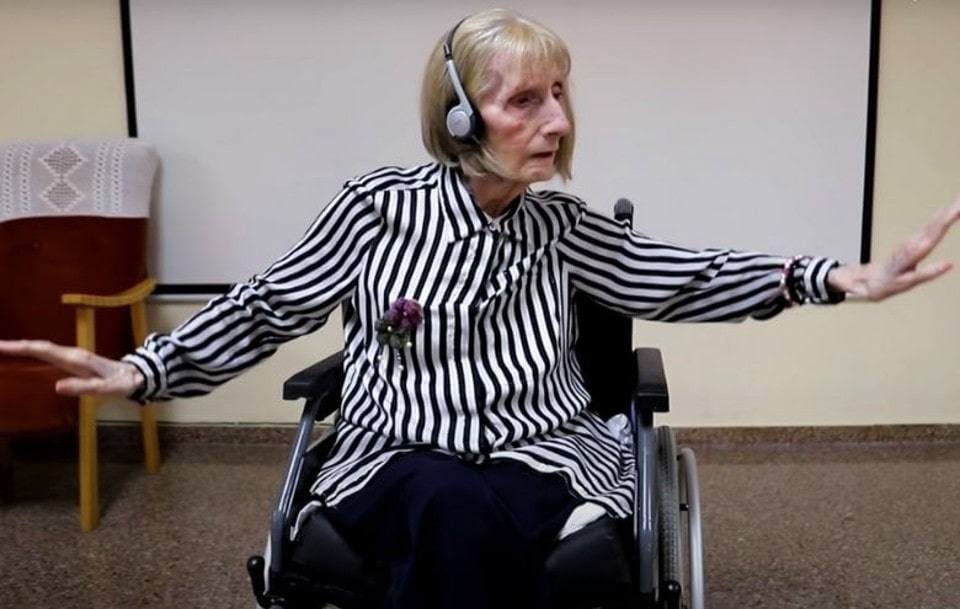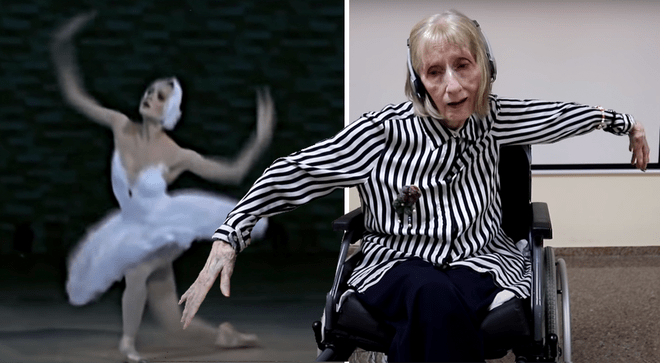It goes without saying that music and exercise can improve your relationship with your body. However, one popular film demonstrates how potent that link can be.
The video features prima dancer Marta C. González, who performed in the 1960s with the New York Ballet. González, who apparently passed away in 2019 after being diagnosed with Alzheimer’s disease, the most common type of dementia, is shown in the video reenacting what appears to be the dance from Swan Lake while listening to the song in her wheelchair.
González appeared to instantly sense an emotional and physical connection to the music she formerly danced to on stage despite the effects of Alzheimer’s illness on her memory; the footage of her remembering the routine is certain to give you chills.

The Asociación Msica para Despertar, a Spanish charity that deals with Alzheimer’s and dementia sufferers and uses music to assist enhance their mood and memory, originally published the video.
But now it’s becoming viral on the internet owing to well-known admirers like Jennifer Garner, Antonio Banderas, and world-famous choreographer Arlene Phillips.
The González video was posted to Instagram along with a caption by Garner that said, “Our intrinsic connection to music, movement, and the arts is amazing.
“The sense memory of Swan Lake that this former ballerina has absolutely melted my heart. We appreciate your participation in the fight against Alzheimer’s.”
On Facebook, Banderas posted the video and expressed his desire for it to be “a well-deserved honor of [González’s] creativity and her devotion.”

González’s “glimpses of remembrance” in the film, according to Phillips (renowned for choreographing several popular musicals, including Grease and The Wizard of Oz), “broke her heart” to see, she wrote in her article. How priceless if music and dance can hold or restore memory, she wrote.
González may have remembered the Swan Lake choreography from her childhood because, although Alzheimer’s and other types of dementia sometimes result in irreversible memory loss, it appears that music (and movement) can help preserve some memories.
Neuropsychologist Kristoffer Rhoads, Ph.D., discussed the potential connections between music and dancing and memory recall in a 2017 cover article for Dimensions, a publication from the University of Washington’s Alzheimer’s Disease Research Center.
The intricate cross-body movements of dance, according to Rhoads, “first and foremost, recruit and exercise the procedural memory system.” According to him, procedural memory is a type of long-term memory that is connected to learned movement sequences (consider motor abilities like walking, driving a car, riding a bike, etc.).
Additionally, he continued, “it is the type of memory that endures longer in those with Alzheimer’s disease, and it may aid individuals in making up for deficits in short-term memory.”
The relationship between music and memory is also examined in the 2014 film Alive Inside. According to neurologist Oliver Sacks, M.D., “music has more ability to engage more areas of the brain than any other stimuli” is heard saying in the documentary’s trailer.
Concetta Tomaino, executive director and co-founder of the Institute for Music and Neurologic Function, continued, “We have a portal to stimulate and reach somebody who’s otherwise unreachable” by utilizing music to activate certain neural pathways in a dementia patient’s brain.




